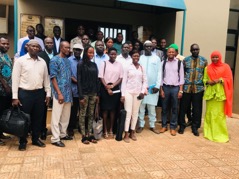
The goal of the project is to enhance citizens’ engagement in local policy processes to improve transparency and accountability as well as to incorporate citizens’ views in local policy decision-making processes to enhance accountability and service delivery.
Lamin Dampha, executive director for CepRass, said the project was the result of the opinion poll conducted by his office ahead of the presidential and National Assembly elections.
“The opinion poll study was to gauge the perception of people on local governance in respect to decentralisation relationships between local and central government and whether the central government is prepared to subvent the Area Councils and Municipalities. The result from the poll indicated that there is a need to conduct a specific program that would be tailored to Local Government to improve accountability and transparency,” he said.
Landing Sanneh, president for The Gambia Association of Local Government Authorities (GALGA) urged everyone to take ownership of the project and work hand in hand to ensure its success.
He noted that, The Gambia as a sovereign nation introduced local governance and decentralisation as part of promoting democracy, transparency and accountability in local service delivery within the country. This he added is aimed at bringing governance to the doorstep of the citizenry in order to encourage participation in decision making as well as implementation of services provided to them. Consequently, chairman Sanneh said the government enacted the Local Government Bill by an act of the National Assembly in 2002, with all its structures and polices in place. Part VI, Section 118 (4b) of the 2002 Local Government Act, stipulates that one of the functions of The Local Government Service Commission is to “make provisions for the overall management and efficiency of the Local Government Service”, while Part VII, Section 129 (a & b) of the same Act, states that “every Council shall be answerable and accountable to – (a) its electorate for all moneys which accrue to the Council from the electorate”; and (b) “the National Assembly for all moneys appropriated to the Council from the Consolidated Revenue Fund, or otherwise.”
This he stated indicates that the Gambian Local Government Councils’ service delivery activities should be subject to public scrutiny by the citizens.



